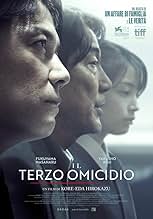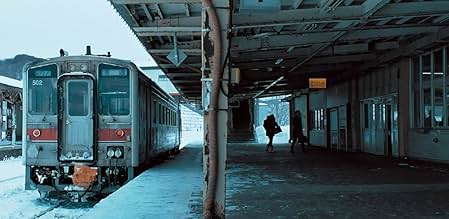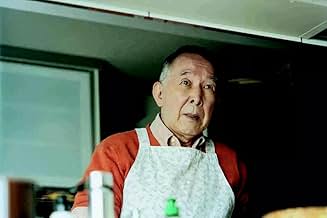IMDb RATING
6.7/10
8.6K
YOUR RATING
A courtroom drama centered around the murder of a factory president.A courtroom drama centered around the murder of a factory president.A courtroom drama centered around the murder of a factory president.
- Awards
- 6 wins & 17 nominations total
- Director
- Writer
- All cast & crew
- Production, box office & more at IMDbPro
Featured reviews
The defense attorney Shigemori (Masaharu Fukuyama) is summoned to help his coworkers in a murder case. The prisoner Misumi (Kôji Yakusho) has confessed the murder of his former boss and factory owner that was burnt to ashes nearby a river to rob his wallet to pay debts in gambling. Misumi will face death penalty since thirty years ago he killed another man and was defended by Shigemori´s father. Shigemori´s purpose is to change the sentence from death penalty to life. Shigemori is not satisfied with the lack of evidences of the case and notes that Misumi changes his testimony in each interview. He decides to investigate deeper the case and questions the true motive for the murder.
"Sandome no satsujin", a.k.a. "The Third Murder", is a tribunal and fatherhood drama with a screenplay with many twists. The storyline is based on a murder case with a confessing defendant and his new attorney seeking evidences to learn the truth. In common, there is the fatherhood: Shigemori is an absent father due to his dedication to his profession. Misumi is also an absent father since he has spent his last thirty years imprisoned. The victim was an abusive father and Misumi connects to his daughter as a second chance in life. In the end, was the murder to pay a debt with the Yakuza or a righteous justice act? My vote is seven.
Title (Brazil): "O Terceiro Assassinato" ("The Third Murder")
"Sandome no satsujin", a.k.a. "The Third Murder", is a tribunal and fatherhood drama with a screenplay with many twists. The storyline is based on a murder case with a confessing defendant and his new attorney seeking evidences to learn the truth. In common, there is the fatherhood: Shigemori is an absent father due to his dedication to his profession. Misumi is also an absent father since he has spent his last thirty years imprisoned. The victim was an abusive father and Misumi connects to his daughter as a second chance in life. In the end, was the murder to pay a debt with the Yakuza or a righteous justice act? My vote is seven.
Title (Brazil): "O Terceiro Assassinato" ("The Third Murder")
One of the most psychologically and thematically complex autopsies of truth, ethics, and morality I've seen. It reminds me of Rashomon in some respects, except that much of the fluidity and subjectivity of truth in this movie is found within a single character, and within societal systems of "truth-seeking," i.e., the "justice" and legal systems. Even the camera movement in this film is perfectly attuned to those themes, subtly moving into, over, and out of scenes from all directions. Koji Yakusho is superb as usual, and all other acting and casting is excellent as well, as is the score and the editing. I will be thinking on this one for a while.
Included in the extras on the Arrow disc of this film is a very thoughtful piece by Tony Rayns. He was careful to avoid as many spoilers as possible and as it turns out I would have done well to listen to him before watching the film. The Japanese judicial system, it turns out, is very different from everybody else's and the 'trial', it would seem is no such thing. Even with the recently reintroduced jury (who seem to play little part) the defendant is pretty much assumed guilty and the whole procedure an opportunity for society, in the form of the judge, to smooth things over and be as precise as possible as to sentence. All this would have helped when watching this rather long and complicated tale. Most of the 'complications' however occur in the matter surrounding admission of guilt and the fact that here, the truth and actual guilt are a moving feast (complete with seeming unreal flat-backs) makes for a difficult ride for the uninitiated. Powerful, nevertheless, with fine central performances and whilst I felt watching the film, that one viewing would be enough, learning more has led me to suppose another viewing might be more enjoyable.
The Third Murder is a gloomy courtroom drama that deals with complex topics like control, fatherhood and righteousness. The story revolves around young lawyer Shigemori who is asked to defend mysterious Misumi. His father once defended the strange man when he committed murder in the past and he managed to change his impending death penalty into a life imprisonment sentence. Soon after his release from prison, Misumi admits to have killed his former boss in order to steal his wallet and settle some gambling debts. However, Misumi soon starts offering different versions of what actually happened. Shigemori is unable to figure his client out but determined to win the case. He starts investigating the complex case himself and stumbles upon the victim's quiet wife and their handicapped daughter who seem to have something to hide. While trying to win the case, Shigemori doesn't only learn more about the lives of everyone involved but about his own family life.
The Third Murder is a movie that is quite tough to watch. Its pace is particularly slow. The investigation process is contradictory, difficult and inconclusive. The film doesn't offer any shifts in action or tension. The conclusion won't please those who are expecting a dynamic crime flick.
However, this film has an almost hypnotically gloomy atmosphere that gives it its very own style from start to finish. The characters are quite intriguing because they are difficult to figure out. Protagonist Shigemori almost pales in comparison to his fascinating client Misumi who meanders between being a manipulative madman, a calm sage in harmony with himself and a mentally broken elder. The dialogues are particularly well-written. The acting performances are quite credible and almost make the movie seem to be a documentary. The locations suit the sinister atmosphere very well as they manage to look beautiful despite their bleak darkness. The calm and precise cinematography completes the picture of this soulful drama.
In the end, you will appreciate The Third Murder if you are ready to watch a slow-paced courtroom drama with an inconclusive plot but intriguing characters and gripping atmosphere. This movie most certainly isn't for everyone but it's good at what it's attempting to be. Patient viewers will be rewarded with some intellectual food for thought.
The Third Murder is a movie that is quite tough to watch. Its pace is particularly slow. The investigation process is contradictory, difficult and inconclusive. The film doesn't offer any shifts in action or tension. The conclusion won't please those who are expecting a dynamic crime flick.
However, this film has an almost hypnotically gloomy atmosphere that gives it its very own style from start to finish. The characters are quite intriguing because they are difficult to figure out. Protagonist Shigemori almost pales in comparison to his fascinating client Misumi who meanders between being a manipulative madman, a calm sage in harmony with himself and a mentally broken elder. The dialogues are particularly well-written. The acting performances are quite credible and almost make the movie seem to be a documentary. The locations suit the sinister atmosphere very well as they manage to look beautiful despite their bleak darkness. The calm and precise cinematography completes the picture of this soulful drama.
In the end, you will appreciate The Third Murder if you are ready to watch a slow-paced courtroom drama with an inconclusive plot but intriguing characters and gripping atmosphere. This movie most certainly isn't for everyone but it's good at what it's attempting to be. Patient viewers will be rewarded with some intellectual food for thought.
The murderer in this film has killed twice. So, why is the film called 'The Third Murder?' It's up to the viewer to answer the question. In my view, the third victim is the truth. As one of the protagonists remarks in a crucial scene: 'No one has spoken the truth'.
'The Third Murder' is a film asking a lot of questions, but answering few. To be clear: that's a good thing. What is truth? What is righteousness? Which of the two are more important for a lawyer? And for a judge? Is capital punishment always wrong? Or, in the words of the killer: should some people never have been born?
With this film, acclaimed film maker Hirukazo Kore-eda takes a different path from many of his previous films. He is known for his delicate and subtle dramas about the family life of ordinary people. This time, he has made a sort of courtroom drama (although only a small part is actually set in a courtroom) about a killer and his possible motives.
Still, the theme of family relations is not absent in this film. Far from it, in fact. Fatherhood is omnipresent. One of the most important characteristics of the killer is how he has failed as a father. The lawyer defending him discusses the case with his own father, a retired judge who has convicted the same killer decades earlier. And the dead victim turns out to have been the worst father imaginable. At least, in one version of the truth.
'The Third Murder' is a multi-layered, complex film which offers lots of surprises and twists. Kore-eda succeeds in keeping the viewer wondering what comes next. But at the same time, the result is less convincing than in some of Kore-eda's best family dramas, in which human nature is dissected by small acts and symbolic details. Not by important, philosophical questions.
'The Third Murder' is a film asking a lot of questions, but answering few. To be clear: that's a good thing. What is truth? What is righteousness? Which of the two are more important for a lawyer? And for a judge? Is capital punishment always wrong? Or, in the words of the killer: should some people never have been born?
With this film, acclaimed film maker Hirukazo Kore-eda takes a different path from many of his previous films. He is known for his delicate and subtle dramas about the family life of ordinary people. This time, he has made a sort of courtroom drama (although only a small part is actually set in a courtroom) about a killer and his possible motives.
Still, the theme of family relations is not absent in this film. Far from it, in fact. Fatherhood is omnipresent. One of the most important characteristics of the killer is how he has failed as a father. The lawyer defending him discusses the case with his own father, a retired judge who has convicted the same killer decades earlier. And the dead victim turns out to have been the worst father imaginable. At least, in one version of the truth.
'The Third Murder' is a multi-layered, complex film which offers lots of surprises and twists. Kore-eda succeeds in keeping the viewer wondering what comes next. But at the same time, the result is less convincing than in some of Kore-eda's best family dramas, in which human nature is dissected by small acts and symbolic details. Not by important, philosophical questions.
Did you know
- TriviaThis is the first fiction film from Hirokazu Koreeda that was shot in anamorphic digital and framed in 2.35:1.
- How long is The Third Murder?Powered by Alexa
Details
- Release date
- Country of origin
- Official sites
- Language
- Also known as
- The 3rd Murder
- Filming locations
- Rumoi Station, Rumoi, Hokkaido, Japan(the three lawyers arrive in Rumoi)
- Production companies
- See more company credits at IMDbPro
Box office
- Gross US & Canada
- $89,315
- Opening weekend US & Canada
- $10,670
- Jul 22, 2018
- Gross worldwide
- $13,411,936
- Runtime
- 2h 4m(124 min)
- Color
- Sound mix
- Aspect ratio
- 2.35 : 1
Contribute to this page
Suggest an edit or add missing content


























